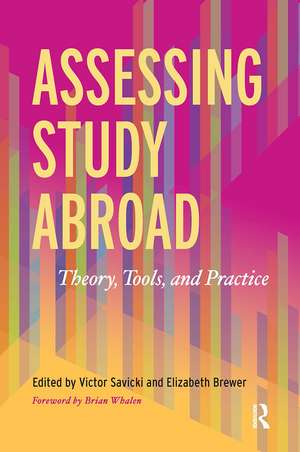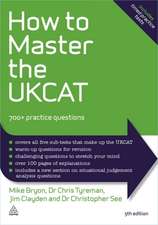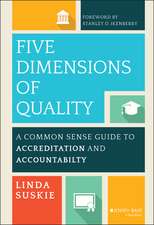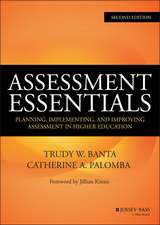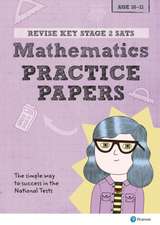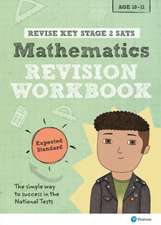Assessing Study Abroad: Theory, Tools, and Practice
Editat de Victor Savicki, Elizabeth Breweren Limba Engleză Paperback – 9 noi 2015
| Toate formatele și edițiile | Preț | Express |
|---|---|---|
| Paperback (1) | 311.60 lei 6-8 săpt. | |
| Taylor & Francis – 9 noi 2015 | 311.60 lei 6-8 săpt. | |
| Hardback (1) | 1005.80 lei 6-8 săpt. | |
| Taylor & Francis – 17 noi 2015 | 1005.80 lei 6-8 săpt. |
Preț: 311.60 lei
Nou
Puncte Express: 467
Preț estimativ în valută:
59.63€ • 62.41$ • 49.63£
59.63€ • 62.41$ • 49.63£
Carte tipărită la comandă
Livrare economică 01-15 aprilie
Preluare comenzi: 021 569.72.76
Specificații
ISBN-13: 9781620362143
ISBN-10: 1620362147
Pagini: 344
Dimensiuni: 152 x 229 x 23 mm
Greutate: 0.5 kg
Ediția:1
Editura: Taylor & Francis
Colecția Routledge
Locul publicării:Oxford, United Kingdom
ISBN-10: 1620362147
Pagini: 344
Dimensiuni: 152 x 229 x 23 mm
Greutate: 0.5 kg
Ediția:1
Editura: Taylor & Francis
Colecția Routledge
Locul publicării:Oxford, United Kingdom
Public țintă
Postgraduate and Professional Practice & DevelopmentNotă biografică
Victor Savicki is Professor of Psychology, Emeritus, at Western Oregon University. His recent research has focused on stress, coping and adjustment in cross-cultural settings. He has participated in a variety of study abroad programs both as an instructor and a researcher. Elizabeth Brewer is Director, International Education, at Beloit College. Brian Whalen is Chief Academic Officer and Dean of Education at Atlantis, a leading healthcare education organization. He serves in the same role for both the Beacon Fellowship and the Lex Fellowship. Brian is also a Director and Advisory Partner at Academic Assembly, Inc., a Dean’s Fellow at Dickinson College, and an International Education Leadership Fellow at the University at Albany. Among the most well-known and influential international education leaders currently working in the field, Brian served for more than a decade (2006-2018) as the President and CEO of The Forum on Education Abroad, the first Standards Development Organization (SDO) worldwide focused on international education. During that time, he oversaw The Forum’s growth into a leading international association, and formidable quality assurance organization for the field of education abroad. He is also an experienced senior international academic officer, having served in that role at Dickinson College and Marist College. A widely published scholar, Brian was founding editor and publisher of Frontiers: The Interdisciplinary Journal of Study Abroad. During his long career, Brian has developed or overseen education abroad programs in more than 50 countries, has delivered dozens of presentations and trainings in the U.S. and many other countries, has collaborated to secure nearly $4 million in grants in support of international education initiatives, and has participated in high-level meetings as a discussant at the U.S. Department of State, U.S. Department of Education, and the White House. Brian has taught graduate and undergraduate courses in
Cuprins
Foreword Introduction. Issues in Assessing Study Abroad—Victor Savicki and Elizabeth Brewer PART ONE. THEORY AND BACKGROUND ON ASSESSING STUDY ABROAD 1. How We Got to Where We Are (and Aren’t. in Assessing Study Abroad Learning—Mark Salisbury 2. Beyond the Study Abroad Industry. Perspectives From Other Disciplines on Assessing Study Abroad Learning Outcomes—Rachel Shively, Nick Gozik, Elizabeth Brewer, Dennis Doyle, and Victor Savicki 3. Closing the Loop. Linking Stages of the Assessment Cycle—Nick Gozik PART TWO. TOOLS AND STRATEGIES FOR ASSESSING STUDY ABROAD 4. Contextualizing the Assessment Journey and Tools for the Trek—Kevin P. Saunders, Jen Hogan, and Christa Lee Olson 5. Using Qualitative Research Methods to Assess Education Abroad—Tasha Bleistein and Mary Shepard Wong 6. Quantitative Approaches to Study Abroad Assessment—Mark E. Engberg and Lisa M. Davidson PART THREE. CASE STUDIES OF PRACTICE IN ASSESSING STUDY ABROAD 7. Where and How Do Students Learn Abroad? Using Reflective Writing for Meaning-Making and Assessment—Elizabeth Brewer and Joshua Moore 8. Adapting the Office Mission and Assessment Practices to Institutional Needs—Nick Gozik 9. Integrated Assessment Strategies. Linking Study Abroad Outcomes to the Liberal Arts Core Curriculum—Dennis M. Doyle 10. Engagement. Assessment's Ability to Connect People, Ideas, and Practice—Kelly McLaughlin 11. Using Data for Improvement and Advocacy. A 10-Year Retrospective on Outcomes Assessment Through Multimethod Longitudinal Studies and Institutional Data—Elaine Meyer-Lee and Karen Chambers 12. Continuous Improvement in a Small Study Abroad Office Using Outcomes Assessment—Victor Savicki and Michele V. Price 13. A Closer Look at the Wesleyan Intercultural Competence Scale. A New Tool for Measuring Study Abroad Outcomes—Steven E. Stemler and Carolyn K. Sorkin 14. Engaging Stakeholders in Assessment of Student Learning in Off-Campus Programs—Joan Gillespie, Elizabeth Ciner, and David Schodt 15. Using a Partnership Approach in Study Abroad. Implications and Strategies for Program Design and Assessment—Mary F. Price, Julie A. Hatcher, Dawn Michele Whitehead, and Gil Latz 16. Capacity Building for Assessing Study Abroad Outcomes—Elizabeth Brewer About the Contributors Index
Recenzii
“One nice feature of this book is that it offers an inside view of ways study abroad administrators can assess their programs. The process is seldom clean or clear-cut, and sometimes the data do not generate the results hoped for. I particularly liked the way Savicki and Price described the development of an in-house assessment tool at Wesleyan University in Chapter 12. That tool can be adapted for use at other institutions freely if proper citations are made. This is welcome because many commercial assessment tools such as the BEVI, GPI, and IDI cost over $20 per participant
(Roy, Wandschneider, & Steglitz, 2012) - a figure that may be beyond the budget range of some schools.
Another nice feature of this book is that it introduces a wide range of theoretical concepts. Although few of these are explained in detail, proactive readers will be able to find more information about unfamiliar ideas and terminology elsewhere. In particular, I felt Saunders, Hogan, and Olson's discussion of a "backward design" assessment process in Chapter 4 was helpful. The final overview of study abroad assessment resources by Brewer was also useful.”
“Assessing Study Abroad has the advantage of offering an in-depth comparison of how nine institutions evaluate their study abroad programs. If you are fairly new to the field of educational assessment and hoping to garner a range of different ideas about how to evaluate the international programs at your school, Saviki and Brewer's book is worth reading. If, however, you are looking for a more practical 'cookbook' approach to assessing study abroad outcomes, perhaps Deardorff’s Demystifying Outcomes Assessment for International Educators: A Practical Approach (2015) might be more useful. That volume offers many handouts, worksheets, and practical ideas for administrators wanting to evaluate their programs. Then again, if you are interested in larger issues of program design and how to optimize pedagogical interventions in addition to assessment issues, I believe that Berg, Paige, and Lou’s Student Learning Abroad: What Our Students Are Learning, What They’re Not (2012) is certainly worth a read. Since more and more financial resources are being devoted to study abroad at many institutions around the world, study abroad advisors and program directors should probably become acquainted with each of these books.”
Ryugaku: Explorations in Study Abroad
“This book on assessment of study abroad [is] timely and relevant. Its framework promotes an institutional approach to assessing study abroad, with advice about and examples of how to embed effective assessment strategies into the workings of a college, university, or education abroad organization. Each chapter presents practical guidance on the many aspects of study abroad assessment that can be approached through a collaborative model of shared responsibility and commitment to benefit all constituents.
This book is distinctive in that it includes both theoretical perspectives from assessment experts, and concrete examples from practitioners who have been involved with different aspects of study abroad assessment. The fact that most of these practitioners are not experts in assessment should inspire other study abroad professionals to develop and sustain their own assessment efforts at their institutions in order to make study abroad a more robust vehicle for student learning and development.
This type of wisdom and experience informs the guidance offered in this book, leading to several qualities that readers will appreciate. First it is written by colleagues who are already doing study abroad assessment at multiple levels of experience and expertise and is therefore relevant for everyone in the field. Second, the theory and methodology are aimed specifically at study abroad, and therefore require no translation from an academic discipline to the study abroad field. Third, the book demonstrates many different approaches to tackling the real challenges and problems that assessment brings by discussing and analyzing both successful projects and the many bumps and pitfalls along the way that lead eventually to success. Finally, this book, unlike other books on assessment, is approachable to practitioners in the field because it explains ideas and methods clearly in clear, jargon free language with plenty of concrete examples to elucidate its points.”
Brian Whalen, President and CEO
The Forum on Education Abroad
"Assessment is both an imperative and a problem. These essays are a vital corrective to simplistic "solutions". They present historical, theoretical and practical perspectives that confront the big questions of why, how and what we assess, and what we do with the landslide of data that threatens to bury us all. This crucial text illuminates what is, indeed, a "complex endeavor", scattered with paradoxes, "dumb questions", and credible answers. Brewer and Savicki have made a major and timely contribution to the literature of international education."
Dr Michael Woolf, Deputy President for Strategic Development
CAPA International Education
“An accessible demystification of assessment relative to study abroad, this book offers a good balance of general research considerations and specific case studies. Writers adopt a straightforward, conversational tone in their sharing of first-hand accounts of the why’s, how’s, and what’s of the assessment process. There is food for inspiration and controversy and, above all, substance for the on-going dialogue regarding learning outcomes so important to the evolution of our problematic field."
Lilli Engle, Founding Director
American University Center of Provence
(Roy, Wandschneider, & Steglitz, 2012) - a figure that may be beyond the budget range of some schools.
Another nice feature of this book is that it introduces a wide range of theoretical concepts. Although few of these are explained in detail, proactive readers will be able to find more information about unfamiliar ideas and terminology elsewhere. In particular, I felt Saunders, Hogan, and Olson's discussion of a "backward design" assessment process in Chapter 4 was helpful. The final overview of study abroad assessment resources by Brewer was also useful.”
“Assessing Study Abroad has the advantage of offering an in-depth comparison of how nine institutions evaluate their study abroad programs. If you are fairly new to the field of educational assessment and hoping to garner a range of different ideas about how to evaluate the international programs at your school, Saviki and Brewer's book is worth reading. If, however, you are looking for a more practical 'cookbook' approach to assessing study abroad outcomes, perhaps Deardorff’s Demystifying Outcomes Assessment for International Educators: A Practical Approach (2015) might be more useful. That volume offers many handouts, worksheets, and practical ideas for administrators wanting to evaluate their programs. Then again, if you are interested in larger issues of program design and how to optimize pedagogical interventions in addition to assessment issues, I believe that Berg, Paige, and Lou’s Student Learning Abroad: What Our Students Are Learning, What They’re Not (2012) is certainly worth a read. Since more and more financial resources are being devoted to study abroad at many institutions around the world, study abroad advisors and program directors should probably become acquainted with each of these books.”
Ryugaku: Explorations in Study Abroad
“This book on assessment of study abroad [is] timely and relevant. Its framework promotes an institutional approach to assessing study abroad, with advice about and examples of how to embed effective assessment strategies into the workings of a college, university, or education abroad organization. Each chapter presents practical guidance on the many aspects of study abroad assessment that can be approached through a collaborative model of shared responsibility and commitment to benefit all constituents.
This book is distinctive in that it includes both theoretical perspectives from assessment experts, and concrete examples from practitioners who have been involved with different aspects of study abroad assessment. The fact that most of these practitioners are not experts in assessment should inspire other study abroad professionals to develop and sustain their own assessment efforts at their institutions in order to make study abroad a more robust vehicle for student learning and development.
This type of wisdom and experience informs the guidance offered in this book, leading to several qualities that readers will appreciate. First it is written by colleagues who are already doing study abroad assessment at multiple levels of experience and expertise and is therefore relevant for everyone in the field. Second, the theory and methodology are aimed specifically at study abroad, and therefore require no translation from an academic discipline to the study abroad field. Third, the book demonstrates many different approaches to tackling the real challenges and problems that assessment brings by discussing and analyzing both successful projects and the many bumps and pitfalls along the way that lead eventually to success. Finally, this book, unlike other books on assessment, is approachable to practitioners in the field because it explains ideas and methods clearly in clear, jargon free language with plenty of concrete examples to elucidate its points.”
Brian Whalen, President and CEO
The Forum on Education Abroad
"Assessment is both an imperative and a problem. These essays are a vital corrective to simplistic "solutions". They present historical, theoretical and practical perspectives that confront the big questions of why, how and what we assess, and what we do with the landslide of data that threatens to bury us all. This crucial text illuminates what is, indeed, a "complex endeavor", scattered with paradoxes, "dumb questions", and credible answers. Brewer and Savicki have made a major and timely contribution to the literature of international education."
Dr Michael Woolf, Deputy President for Strategic Development
CAPA International Education
“An accessible demystification of assessment relative to study abroad, this book offers a good balance of general research considerations and specific case studies. Writers adopt a straightforward, conversational tone in their sharing of first-hand accounts of the why’s, how’s, and what’s of the assessment process. There is food for inspiration and controversy and, above all, substance for the on-going dialogue regarding learning outcomes so important to the evolution of our problematic field."
Lilli Engle, Founding Director
American University Center of Provence
Descriere
This book is intended to guide advisors, administrators, and faculty members engaged with study abroad who are concerned with answering the question: what does study abroad achieve? It will also inform the work of study abroad organizations as well as institutions receiving study abroad students.
